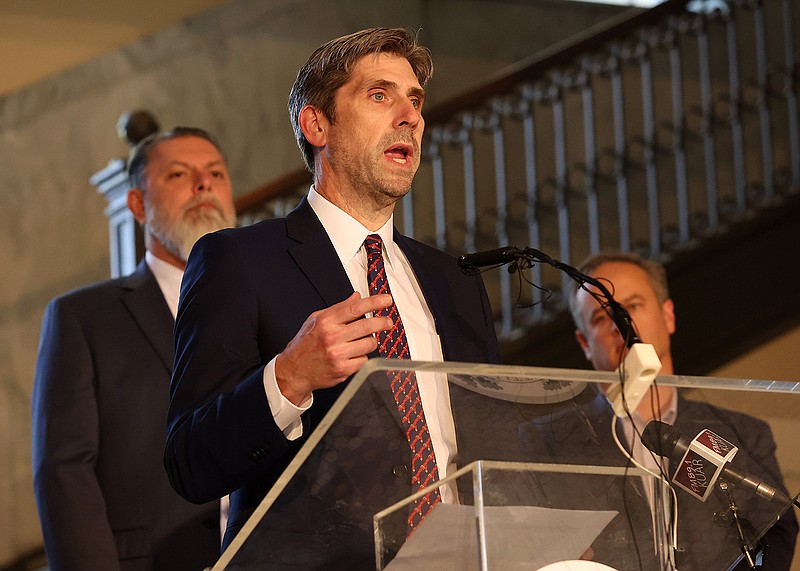Little Rock Mayor Frank Scott Jr. at a City Hall news conference on Tuesday suggested that debris removal work by a contractor after a March 31 tornado may cost up to $10 million.
Scott emphasized that the figure was merely an estimate.
City officials expect to get fully reimbursed by the Federal Emergency Management Agency for tornado-related expenses incurred during the window of April 10 to May 13, including work performed by the contractor, Scott said. After May 13, FEMA is expected to reimburse up to 75% of costs, according to the mayor.
Debris will continue to be removed over the next 60 to 90 days, Scott said.
The city has tapped DRC Emergency Services, a firm based in Galveston, Texas, to remove debris at the curb in neighborhoods hit by the powerful EF3 tornado.
More than 30 of the contractor's trucks were working 7 a.m. to 7 p.m. seven days a week, a city news release said last month.
Residents have been asked to separate debris by type to facilitate collection, grouping together tree and yard waste, construction debris, regular household waste and tires.
Crews started by collecting vegetative debris to allow preparations at the landfill for it to be able to accept a large volume of construction material or mixed debris, Little Rock Public Works Director Jon Honeywell said during the news conference Tuesday, which was held to update residents on the progress of recovery.
Since April 20, the contractor has removed approximately 152,000 cubic yards of material from the tornado's path, including roughly 3,000 individual loads of material, according to Honeywell.
Now that the landfill has been prepared, as of Monday the contractor has started removing construction debris and mixed-debris piles, Honeywell said.
When materials are mixed, "we have to treat all of that as a construction-debris pile and it has to go in the landfill," which has contributed to the delay in getting some debris picked up, he said.
Little Rock Parks and Recreation Director Leland Couch reviewed the damage to three major city parks.
The Rock Creek Trail will remain closed to the public "for some time due to the isolated location, but our contractor will be cleaning up the storm debris in that area," Couch said.
Reservoir Park's 70 acres were "completely destroyed," Couch said. Over $1 million in assets such as a pavilion, restrooms, disc golf course and ball field lighting have been lost there, he said.
The park has been used as a citywide dumping site for debris and until recently was open to the public for debris drop-off.
"This park will be closed for a long, extended period of time and will be rebuilt," Couch said. "I'm excited to be able to have an optimistic viewpoint and see what we can do for Reservoir and make it better for the future."
Fifty acres of Murray Park along the Arkansas River were impacted, the majority of it the dog park, soccer fields, restrooms, pavilions and a fitness area known as a FitLot, Couch said.
The nearby Rebsamen Golf Course and the Arkansas River Trail have reopened, he said. Other parts of Murray Park are expected to reopen in phases starting on Monday, Couch said.
Little Rock Planning and Development Director Jamie Collins said Tuesday that the city has waived $47,000 in fees in the tornado-affected area.
During the same news conference, Scott announced that a city disaster relief fund has received a little more than $300,000 in donations from 500 individual donors.
He indicated the funding "more than likely" will go directly to organizations helping tornado victims. Officials also will try "to get some of these dollars to as many directly impacted individuals as possible," Scott said.
Donated goods are no longer being accepted at a 7000 Murray Street site, he said.
He encouraged residents to make donations of food to the Arkansas Foodbank and Arkansas Hunger Relief Alliance; non-food donations should be directed to Goodwill, Scott said.
When asked about how costs to the city associated with the March 31 tornado compared to other past disasters, Scott's spokesman Aaron Sadler later said in an email that the 2019 Arkansas River flooding resulted in $646,808 in project costs approved through FEMA. Figures tied to the January 1999 tornado outbreak in Arkansas were not immediately available, according to Sadler.
